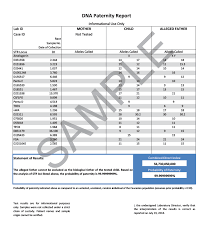
The Importance of DNA Paternity Testing
In today’s world, DNA paternity testing has become an essential tool in determining biological relationships between individuals. Whether for legal reasons, personal peace of mind, or medical purposes, the accuracy and reliability of DNA testing have revolutionized the way we establish paternity.
Accuracy and Reliability
One of the key reasons why DNA paternity testing is highly regarded is its unparalleled accuracy and reliability. By comparing specific genetic markers between a child and a potential father, scientists can determine with a high degree of certainty whether a biological relationship exists. This level of precision has made DNA testing the gold standard in establishing paternity.
Legal Implications
For many families, especially in cases of child support, custody battles, or inheritance disputes, having legally admissible proof of paternity is crucial. Courts often rely on DNA test results to make important decisions regarding parental rights and responsibilities. In this context, DNA paternity testing provides concrete evidence that can have far-reaching legal implications.
Personal Peace of Mind
Aside from its legal significance, DNA paternity testing also offers individuals personal peace of mind. Whether seeking to confirm a biological relationship or dispel doubts and uncertainties, knowing the truth about one’s genetic heritage can bring closure and emotional clarity to individuals and families.
Medical Benefits
In some cases, DNA paternity testing can have important medical benefits. Understanding one’s genetic background can provide valuable information about potential health risks or hereditary conditions that may impact future generations. This knowledge allows individuals to make informed decisions about their health and well-being.
Conclusion
In conclusion, DNA paternity testing plays a vital role in modern society by providing accurate, reliable, and legally recognized evidence of biological relationships. Whether for legal proceedings, personal reassurance, or medical awareness, the importance of DNA testing in establishing paternity cannot be overstated.
5 Essential Tips for a Reliable DNA Paternity Test: Accuracy, Selection, and Support
- Ensure the DNA sample is collected from all parties involved in a controlled and sterile environment.
- Choose a reputable and accredited laboratory to perform the paternity test.
- Follow the instructions provided by the testing company carefully to avoid any errors in sample collection or submission.
- Understand the limitations of a DNA paternity test, as it may not always provide conclusive results.
- Consider seeking professional guidance or counseling both before and after taking a DNA paternity test.
Ensure the DNA sample is collected from all parties involved in a controlled and sterile environment.
It is crucial to ensure that the DNA sample is collected from all parties involved in a controlled and sterile environment. By conducting the collection process in a controlled setting, such as a laboratory or clinic, the risk of contamination or tampering with the samples is minimized. This strict protocol helps maintain the integrity and accuracy of the DNA paternity test results, providing reliable information for legal, personal, or medical purposes.
Choose a reputable and accredited laboratory to perform the paternity test.
When opting for a DNA paternity test, it is crucial to select a reputable and accredited laboratory to ensure the accuracy and reliability of the results. A trusted laboratory will adhere to strict quality control measures, use advanced testing technologies, and maintain confidentiality throughout the process. By choosing a reputable facility, you can have confidence in the validity of the test outcomes and make informed decisions based on reliable genetic information.
Follow the instructions provided by the testing company carefully to avoid any errors in sample collection or submission.
It is crucial to follow the instructions provided by the testing company meticulously when undergoing a DNA paternity test. By adhering to the guidelines for sample collection and submission, individuals can minimize the risk of errors that could compromise the accuracy of the results. Properly following these instructions ensures that the testing process is conducted smoothly and efficiently, ultimately leading to reliable and conclusive outcomes regarding paternity.
Understand the limitations of a DNA paternity test, as it may not always provide conclusive results.
It is crucial to understand the limitations of a DNA paternity test, as it may not always yield conclusive results. While DNA testing is highly accurate, there are rare instances where factors such as sample contamination, technical errors, or complex genetic variations can lead to inconclusive or ambiguous results. Therefore, it is important to approach the results of a DNA paternity test with caution and seek professional guidance to interpret any uncertainties that may arise.
Consider seeking professional guidance or counseling both before and after taking a DNA paternity test.
When considering a DNA paternity test, it is advisable to seek professional guidance or counseling both before and after the test. Before taking the test, consulting with a professional can help you understand the implications of the results and prepare you for any potential emotional outcomes. Additionally, seeking counseling after receiving the results can provide support in processing the information and navigating any changes that may arise in your family dynamics. Professional guidance can offer valuable insight and assistance throughout the entire process of DNA paternity testing.
